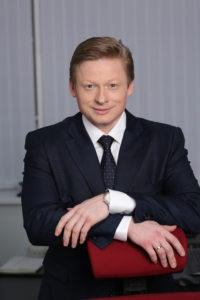On Dec.1, at the meeting with the business community, the President Petro Poroshenko publicly signed Law No. 2213-VIII. The high-profile event occurred under bright flashes of cameras and in a crowded hall. That was a message from the authorities to Ukrainian and foreign investors. The event also came as no surprise: for the previous two months, foreign investors had been openly sharing their experience of searches and harassment, the seizure of documents and computer servers by law enforcement.
Only without the participation of media. The Prosecutor General Yuriy Lutsenko had several times to go up to the rostrum.
Popular television comedy shows in the 1990s dubbed such harassment “Mask Shows.” But instead of jolly actors, fully armed people in the balaclavas would turn up at businesses This practice continued into the 21st century. The cadence of Poroshenko was no exception in this regard.

Volodymyr Vashchenko, attorney-at-law, managing partner at VB PARTNERS (Mokhnach Konstantin)
Following a meeting in September, on Oct. 5, 2017 the Prosecutor General Yuriy Lutsenko issued a letter on the Prevention of the Violation of Business Entities’ Rights. On Nov. 10, Prime Minister Volodymyr Groysman registered in parliament a corresponding bill, No. 7275. The title of the resulting law, No. 2213-VIII, which entered into force on Dec. 7, is lengthy, as is traditional for Ukrainian lawmaking, and reads in part: “On Amendments … to Ensure Compliance with the Rights of Participants in Criminal Proceedings …” But the length of the law’s title also represents recognition by the state of the fact that the law enforcement agencies have for years systematically violated private rights without legitimate reasons. Under the new law, it is now envisaged that searches conducted under a court warrant must be recorded on video. All that is not recorded by the investigator is recognized as inadmissible evidence. Moreover, the defense team may independently carry out its own recording.
Entry and searches of a premises in order to save people or property, or while in pursuit of persons suspected of committing a crime, may be conducted without a court warrant.At the same time, the evidence collected shall be admissible only if the judge has ensured the court hearing is also recorded on video. However, the use of video recording by courts will become mandatory only from Jan. 1, 2019. A person, whose premises are being searched, may engage an attorney-at-law which should be admitted at any stage of the search. Violation of this rule leads to inadmissibility of evidences gathered by investigator. But the attorney-at-law will need to prove that they were not admitted.
Now it is forbidden to temporarily withdraw electronic information systems, computer servers and mobile phones. However, they can still be seized if that they have to be examined by experts, have been used to commit a crime, or if the systems and phones have information that cannot immediately be accessed so that it can be copied.
Also from March 15, 2018, additional amendments will be introduced. The terms of pre-trial investigations with no suspects will be limited for 12 or 18 months depending on the severity of crimes. The expiration of the terms will be the basis to close the criminal proceeding. Nevertheless, investigating judges were granted the right to extend the deadlines for an unlimited number of times. Moreover, these changes will apply only to criminal offenses registered after March 15.
We understand that exceptions to the rules may be both reasonable and necessary. However, our own understanding of the norms by the investigating agencies often opened opportunities to manipulate the law. It depends entirely on who is directing the national security, defense and law enforcement agencies, and what tasks they are given to carry out.
Hence, a proper approach to solve problems is not to endlessly make improvements to codes.
Business expects an improvement in the investment climate. The government wants gross domestic product to grow. The president and the prime minister have sent a message, but they will also have to show some political will. That means giving up using law enforcement agencies in the authorities’ own interests, and making further reforms in the law-enforcement sphere.
